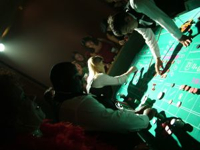
Are you interested in how video games and simulations support teaching and learning? Then the 4th annual GLS is where you should be this week. For my money it is the lowest signal to noise event that I attend all year. Oh – and you get to play some really fun games.
Here are a few random observations from day one – by no means a comprehensive review of the event or the topics covered.
In the opening session Cory Ondrejka noted that all the interesting questions about games and learning are interdisciplinary. This is a real challenge because in the institutional structure of a university there is no political base to sustain research.
Katie Salen challenged the group to think bigger – she feels we are in danger of not working to implement the things we are finding out at scale. I’m not sure I agree completely with here given some projects that I’m aware of – but those may not be visible to the academic community.
Kurt Squire noted that we need to move beyond just games and look at the conditions they create. This is in sync with a conversation I had with Atsusi “2C” Hirumi the other day where he talked about focusing on the elements of “interactive media” rather than just “games.” I think this is an excellent distinction and could also help address Katie’s concerns.
David Shaffer presented some really interesting work on assessment – essentially a model for testing an evolving worldview (epistemic frame) not just discrete knowledge and skills. There is a lot of math – but this approach basically measures the relationship between several important criteria (values, skills, etc.) over time. It has some really intriguing implications for measuring 21st Century Skills. To Cory’s point this is possible because David is bringing a cross disciplinary toolkit of psychological techniques together educational theory and interactive media.
There is a strong thread of using game design itself to teach 21st Century Skills. I worry that this is a bit of having a hammer so the world looks like a nail. In the end while many schools are giving lip service to 21st Century Skills they are getting measured and rewarded for improving reading and math scores. Until we can help them directly with that challenge we won’t get permission to go deeper.
 A random observation – if you want to encourage groups of kids to work together your games need to work more like Craps and less like Blackjack. The whole table wins at Craps together so you get a lot of crosstalk. In Blackjack you can take my “pefect” card – we play against the dealer but we don’t play together. It is a quieter game.
A random observation – if you want to encourage groups of kids to work together your games need to work more like Craps and less like Blackjack. The whole table wins at Craps together so you get a lot of crosstalk. In Blackjack you can take my “pefect” card – we play against the dealer but we don’t play together. It is a quieter game.
The game room is also great – Madison is alive with GTA, Wii Fitness Fanatics, Rock Star. and Portal. Lots of fun stuff to preview and test out. I’m embarrassed about my Wii Fitness score – my only excuse is I’m coming off a month of back problems. Sigh.
The Jason Project previewed Resilient Planet – which looks like a great game for teaching scientific thinking by recreating ground breaking experiments in the field with guidance from experts. Kudos to them for this work.
I did a preliminary release of the white paper I’m writing for the Software Information Industry Association on Best Practices for Implementing Games in the Classroom. It was well received and several practitioners validated the findings as consistent with their experience. I”ll post more on this separately.
 The Education Business Blog
The Education Business Blog

